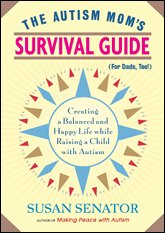Susan Senator
All happy families are not alike...

…Families need help determining whether their children actually improved due to whatever therapies they’re using, or if they were simply misdiagnosed as “lower functioning” at the first office visit…
… If these children are all autistic, why do their outcomes vary so much? Why do some children seem to benefit from certain therapies while others do not? It is this confusion that gives autism a particularly soul-consuming quality for parents. Unlike most other medical diagnoses, there’s little precision or clarity—about what the disorder is, what the prognosis is, or about how best to treat it.
Raquel from Arizona was spitting mad when I first talked to her about her child’s autism. The ambiguity of the spectrum left her filled with a sense of frustration and impotence. She felt she was being led nowhere by doctors, autism books, and the autism community at large. “With most other special needs, you know more,” Raquel said, and as the mother of both a child with cerebral palsy and one with autism, she should know. “With my older son, who has CP, we looked into a couple of alternative therapies. But we understood that no matter what, he’s still going to have CP. We weren’t going to be able to cure him.” In the case of autism, however, many parents and professionals feel that one therapy or another can not only improve a child’s functioning but can actually cure them.
Raquel, like many autism parents, believes that autism is a unique childhood disorder in that so many children are diagnosed but so little is known about best practice, treatment, and prognosis. “What we’re calling autism is probably a bunch of different things,” Raquel says. Although not everyone I talked to would agree with Raquel on this assertion, most parents would agree that the spectrum is huge and varied and that that in itself can be an obstacle to our peace of mind.
Copyright 2010, Susan Senator